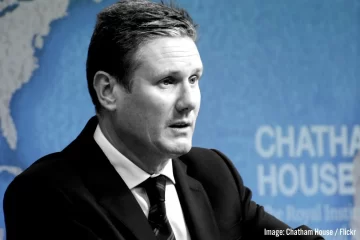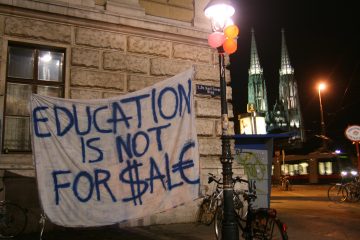For decades there was one mantra went it came to the youth and politics; they don’t mix. Time and time again the belief of politicians, members of the public and young people themselves was that 21st century politics was an old man’s game. Young people were content at best, apathetic at worst, as the older generation squabbled over the bureaucratic process politics had become. Times have certainly changed. Corbyn, Sanders and the SNP have all found their campaigns jettisoned from obscurity to world-defining on the back of dedicated and enthusiastic support from the youth.
Activism is quickly replacing apathy, hope is replacing pessimism. It is not limited to gender, race or religion. The revival of young people’s interest in politics is seen in all layers of society. The 2015 general election saw the youngest Parliamentary prospective candidate, Solomon Curtis, stand at age 18. Whilst his election bid failed the youngest MP since 1832, Mhari Black, was elected at the age of 20.
This revival is not just limited to traditional politics. Young people are becoming a more and more important factor throughout the West. In the France, the Night Stands Up Movement (#NuitDebout) has attracted widespread support from young people who are further radicalizing it and being radicalized themselves. Throughout Britain the youth are quickly embracing more revolutionary ideas as shown by growth of the Marxist Student Federation; people are searching for possible alternatives as Church halls, school halls and universities are packed with debates on a new society. Yet, despite all of this there is a contradiction; turnouts in elections from young people remain shockingly poor, with less than 50% of 18 to 25 year olds bothering to vote in the 2015 election; even with Corbynmania membership of political parties remains low. To discover the root of this contradiction we have to examine the wider situation.
With some quick arithmetic we can work out that the 16-25 year olds of today were born between 1990 and 2000, the so called millennials. This was claimed to be the post-ideological age. The Soviet Union destroyed, trade unions crushed, capitalism reigned supreme. Western capitalism expanded all across the globe opening up China, Russia and the developing world. With this came technological wonders on a scale never before seen. From PCs, to the internet, to mobile phones, people’s everyday lives were revolutionised as gadgets poured into the homes of all. For a brief period capitalism appeared limitless and unbound. The political questions were no longer about how what society we should have, but rather how to manage our pre-existing one. Questions about class struggle were replaced with questions over maintenance of the status quo; debates about economies of abundance were replaced with discussions on how to tackle climate change. In short political questions became bureaucratic ones. Emotion replaced ideology.
This gave way to two distinct viewpoints. Either you thought the world was overall a good place and politics was about managing the current system – i.e. political debate was simply a matter of finding the objectively best solution rather than deciding between antagonistic class interests. Or you believed the world was inherently evil, big corporations just wanted to kill polar bears for the sake of it and politicians got a kick out of bombing the Middle East. Yet, if the world was full of inherently evil people there was very little you could do to solve it. Thus on the one hand politics was the technocracy of the “centre ground” aimed at micromanaging society on every level, on the other it was a conspiratorial and pessimistic landscape far removed from ever changing society. Not one of these could inspire political devotion or even create any real interest. With nothing to harness political disaffection and minimal reasons to be disaffected the idea of TINA (There is No Alternative) prevailed.
Yet, in 2008 this process was violently disrupted. The world economy came slamming to a halt and suddenly all of capitalism’s contractions and crises came to a head. It was a turbulent time yet opposition still remained scarce. Many thought and hoped that 2008 would simply be a hiccup as capitalism came to terms with being the hegemonic and unopposed economic system on the planet. It’s now eight years on and rather than a minor tumble, the system unable to rise at all.
The resulting austerity hit young people hard. Tuition fees trebled and student grants were abolished. The price of houses skyrocketed and employment on a decent wage with a good contract dried up. Throughout the 2000s an idyllic dream of middle class suburbia was portrayed as the reward for those who were willing to work hard. The reality for most young people now is a life chained in debt and exploited at every turn. For those under 18, youth services were cut, exams were made more difficult and the school leaving age was raised. Apprenticeships were created so young people could be employed for £3.30 an hour, and whilst the 2014 Autumn statement saw a rise in the minimum wage for all members of society, under 25s were excluded.
Is it then any wonder why this generation of young people has now burst onto the political scene with youthful faces and a determination to change the world? The most shocking thing about this development is how slow the rest of society has been to realise it. Many still speak as if the post ideological age continues, the anti-Corbyn Labour establishment feel compelled to move to the “centre” and are horrified that there grassroots do not feel the same. Even the so-called radicals tend to speak in single issue politics which characterised the turn of the century. It is not one change to the existing society that young people want to see, but instead a change to society as a whole. The argument for what this new society should be has yet to be won and many do not know. But with every passing week more and more realise that fundamental change is necessary.
Young people are not homogenous and many do not feel this way. Many still hold onto the bureaucratic and single-issue politics of the past, but they are quickly finding themselves left behind by events. As this generation’s options grow smaller and smaller; as it becomes obvious to all that the promise of a decent standard of living is a lie; an alternative society will need to be presented and argued for. Those who were raised on the doctrine of ‘TINA’ will be shown that this was false. This is already beginning to take place. Then will we see the rise of the revolutionary generation.
by Thomas Soud, Sussex Marxists



